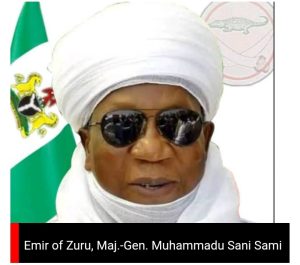

,,,,,Kebbi state mourns.
By Correspondent.

(C) Punch.
Kebbi State, North West Nigeria, has been thrown into mourning following the passing of the Emir of Zuru, Maj.-Gen. Muhammadu Sani Sami (retd).
The revered traditional ruler died on Saturday night in a London hospital at the age of 81 after a brief illness.
His death was confirmed in a statement issued in Birnin Kebbi on Sunday by the Commissioner for Local Government and Chieftaincy Affairs, Alhaji Garba Umar-Dutsinmari.
The late Emir is survived by four wives and seven children.
In a condolence message, the Kebbi State Government described the deceased as a highly respected leader whose reign contributed immensely to peace, unity, and development in Zuru Emirate and the state at large.
“The government extends its heartfelt condolences to the immediate family of the late Emir, the Zuru Emirate Council, the people of Zuru, and the entire people of Kebbi State.
“May Almighty Allah forgive his shortcomings and grant him Aljannatul Firdaus,” the statement read.
Maj.-Gen. Muhammadu Sani Sami (Rtd.), the late Emir of Zuru, was born on October 24, 1943, in Zuru, Kebbi State.
He began his military career in December 1962 as an officer cadet and was commissioned at Mons Officer Cadet School, Aldershot, United Kingdom, in July 1963.
Over the years, he distinguished himself through advanced training at the Armed Forces Command and Staff College, Jaji, and the Postgraduate Naval College in Monterey, USA, where he earned a Higher Diploma in Defence Management.
His dedication and discipline paved the way for a remarkable military journey that later transitioned him into a lifetime of traditional leadership.
During his military service, Sani Sami held several high-profile commands, including serving as Commander of the Brigade of Guards under Head of State Gen. Murtala Mohammed in the mid-1970s.
He went on to become the Military Governor of Bauchi State between January 1984 and August 1985 under General Muhammadu Buhari’s regime, where he championed agricultural reforms and improved healthcare delivery, notably introducing the “Back to Land” program.
He later commanded the 82 Division in Enugu and the 1 Division in Kaduna before retiring from the Nigerian Army as a Major General in September 1990, leaving behind a record of discipline, service, and national dedication.
Following his retirement, he ascended the throne as Emir of Zuru around 1995, a role in which he distinguished himself as a promoter of culture, peace, and unity.
He actively supported the Uhola Cultural Festival, pushed for tourism development across Zuru, and encouraged returning ex-service personnel to embrace farming for self-reliance.
Widely respected for his humility, simplicity, and devotion to heritage, the late Emir consistently urged his people to embrace brotherhood and harmony.
Until his passing in London in August 2025 at the age of 81, he remained a symbol of leadership who balanced military discipline with cultural stewardship and development-focused traditional rule.
Edited by Dada Ahmed.

